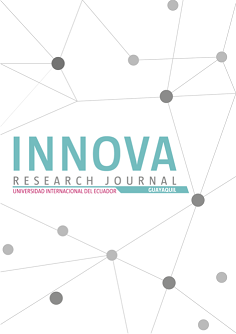DENOMINATION OF ORIGIN OF ECUADORIAN COCOA: A CONTRIBUTION OF GLOBAL MARKETING?
Main Article Content
Abstract
The present investigation is based on the importance of fine cocoa with an Ecuadorian aroma that symbolizes 60% of the market worldwide. Through a descriptive-correlational, multivariate study and the collection of applications such as interviews, the characteristics of organic cocoa are evidenced, quoted for its excellent base notes of flowers for the production of by-products in Europe, North America and Asia. With the intention of encouraging international trade, the Ecuadorian Institute of Intellectual Property (IEPI), in 2008, prescribed the designation of origin "Cacao Arriba" unfortunately its certification was sent for all the fine aroma cocoa that came from the national territory. Among the results found, it was identified that in the case of Ecuador, the "upstream zone", recognized since colonial times, represents the Lower Guayas River Basin that make up the provinces of Los Ríos and Guayas, which has particular characteristics the climatic influence, the current of Humboldt and El Niño. However, the denomination of origin in Ecuador is set out for the purpose of promotion, with the guarantee that it contradicts the characteristics of geographical discrimination, which is specific to a strictly delimited area, its impact among farmers did not extend, while for the international market it is not an evidence of organoleptic characteristics that guarantee the origin, characteristics and specific quality of the product; therefore, it does not represent a global marketing
Downloads
Article Details
COPYRIGHT NOTICE
Authors who publish in the INNOVA Research Journal keeps copyright and guarantee the journal the right to be the first publication of the work under the Creative Commons License, Attribution-Non-Commercial 4.0 International (CC BY-NC 4.0). They can be copied, used, disseminated, transmitted and publicly exhibited, provided that: a) the authorship and original source of their publication (magazine, publisher, URL and DOI of the work) is cited; b) are not used for commercial purposes; c) the existence and specifications of this license of use are mentioned.
References
Anecacao. (2016). Ecuador Desplaza a Camerún en Ranking mundial cacaotero. El Universo.
Ayestarán Raquel, Planificación estratégica y gestión de la publicidad, Madrid, 2012.
Cavaller Víctor, Análisis de la producción científica y de patentes en el caso del tratamiento del resveratrol, QUIC& VECT ,2008.
Cateora, P., & Graham, J. (1999). Marketing Internacional. México: Mc Graw Hill.
Contreras, C. (1990). El sector exportador de una economía colonial.
Declaración de Denominación de origen “CACAO ARRIBA”.
Díaz Márquez, Las denominaciones de origen del vino en España, 2008.
Errázuriz, C. (2010). Indicaciones Geográficas y Denominaciones de Origen. Propiedad Intelectual en progreso. Revista Chilena de Derecho, 207-239.
FAO-IICA. (2008). Calidad de los alimentos vinculada al origen y las tradiciones en América Latina: estudio de casos. (Alprigrama, Ed.) Lima.
Garzón Castrillón, El desarrollo organizacional y el cambio planeado, Bogotá, 2005.
Granados, L. (2004). Indicaciones geográficas y denominaciones de origen: un aporte para su implementación en Costa Rica. Costa Rica.
Ilbery, B. & Kneafsey, M. (2000). Producer constructions of quality in regional speciality food production: a case study from south west England. Journal of Rural Studies, 16(2), 217-230. doi.org/10.1016/S0743-0167 (99)00041-8.
Millán Francisco, La denominación de origen: su protección jurídica, España, 2008.
Porras, V. H., & Sánchez, J. A. (1991). Enfermedades del Cacao. Honduras.
Rodríguez, G. (2004). El derecho a ostentar la denominación de origen. Lasdisputas por la hegemoníaen el mercado agroalimentario mundial. Desacatos, 15-16. Doi: Disponibleen: <http://www.scielo.org.mx/scielo.php?script=sci_arttext&pid=S1607-050X2004000200010&lng=es&nrm=iso>. ISSN 2448-5144.
SENADI. (s/f.). Identidad Ecuatoriana en productos propios. Obtenido de Servicio nacional de Derechos Intelectuales: https://www.propiedadintelectual.gob.ec/denominacion-de-origen/.
Secretaria de Economía. gob.mx/se. Obtenido de https://www.gob.mx/se/articulos/mexicocuenta-con-16-denominaciones-de-origen?idiom=es.






